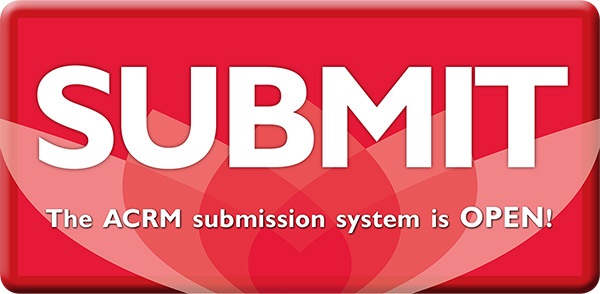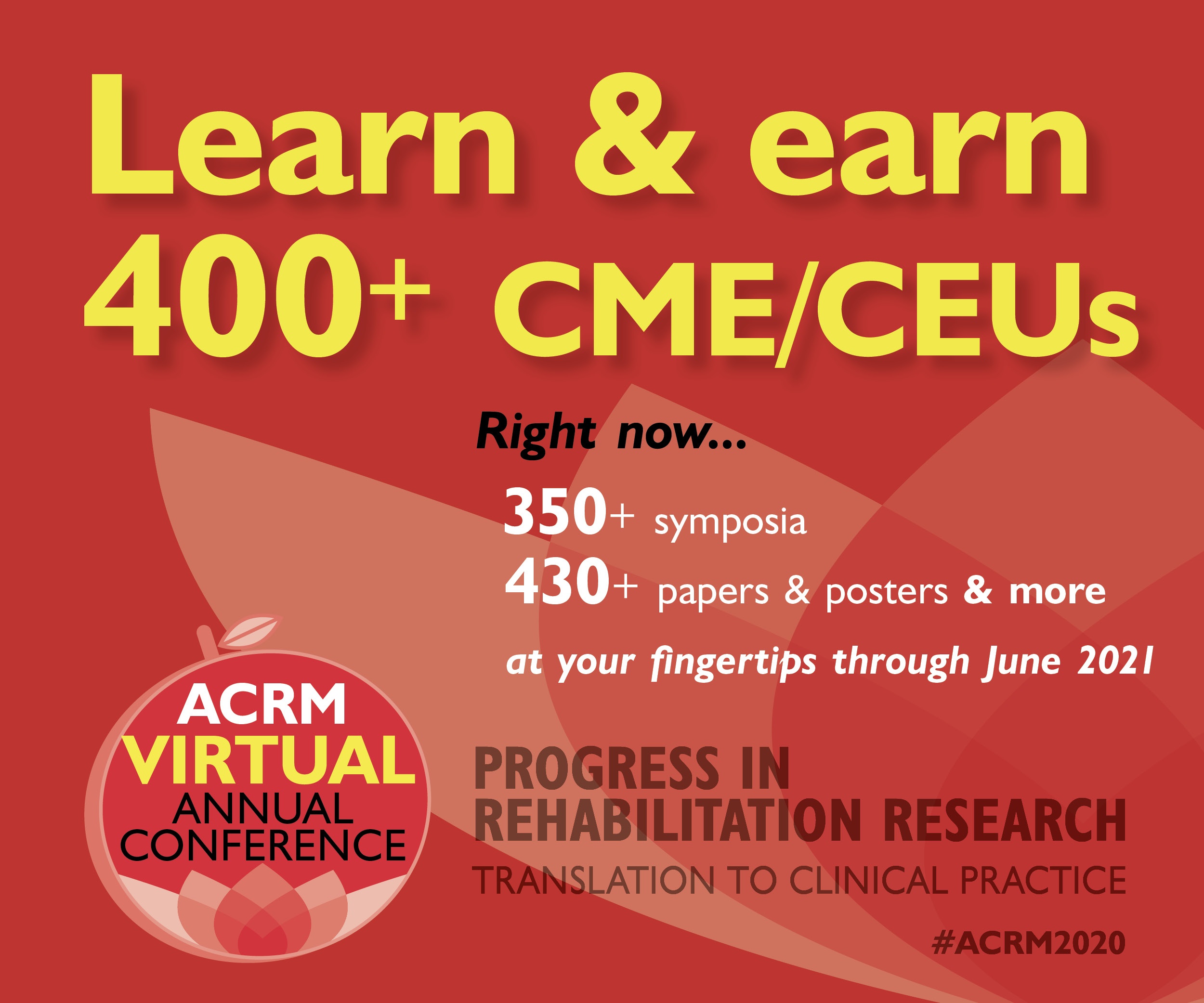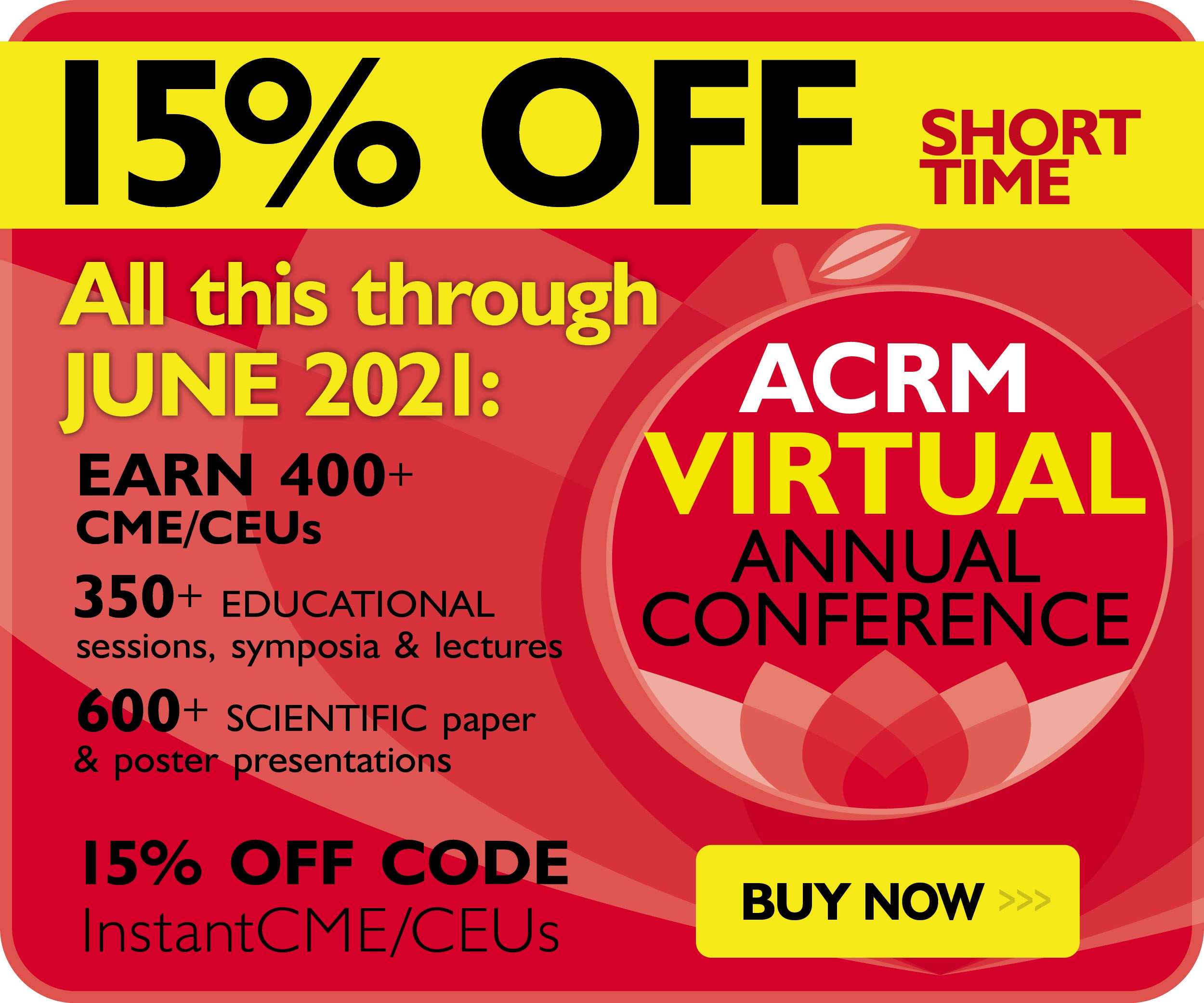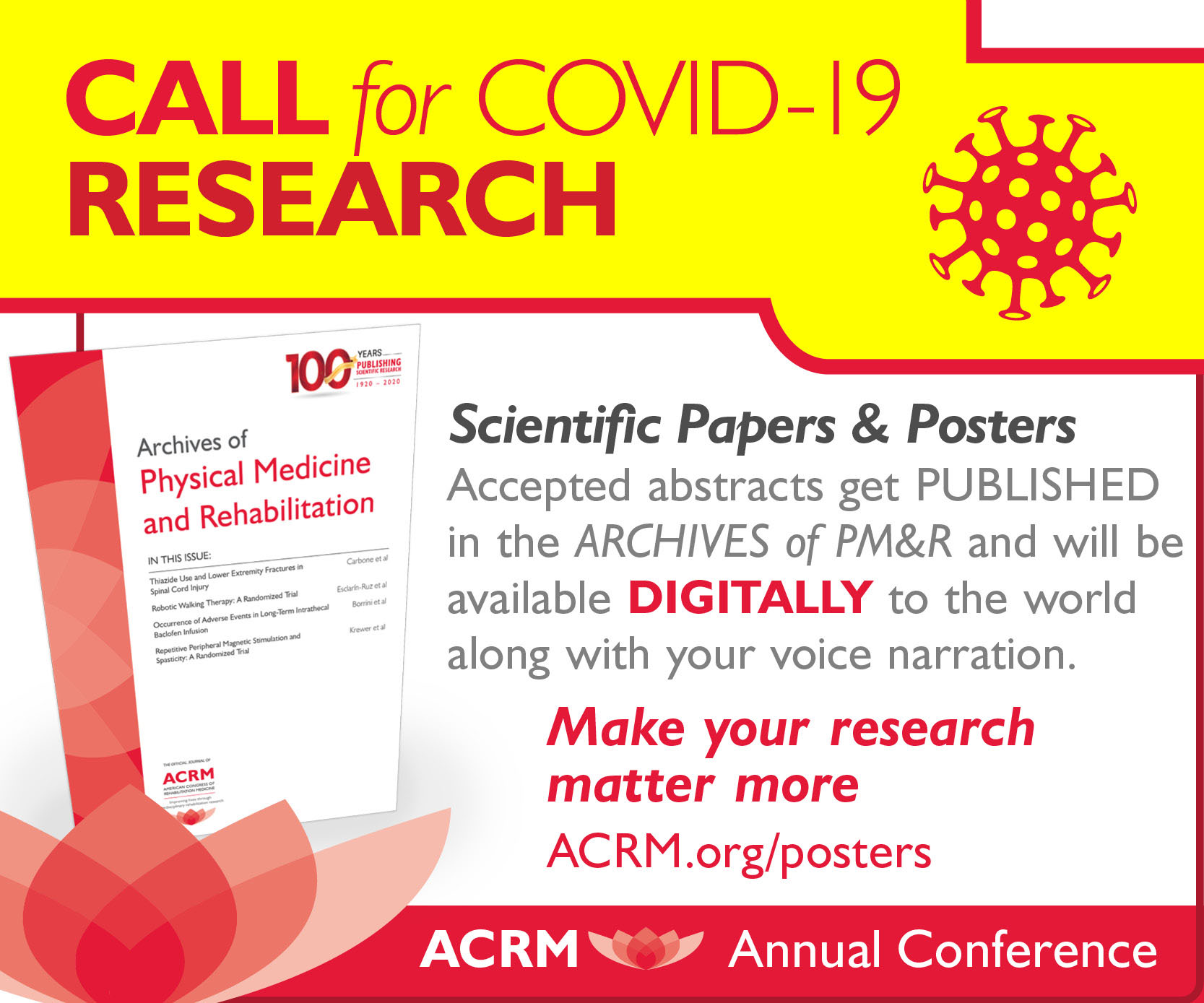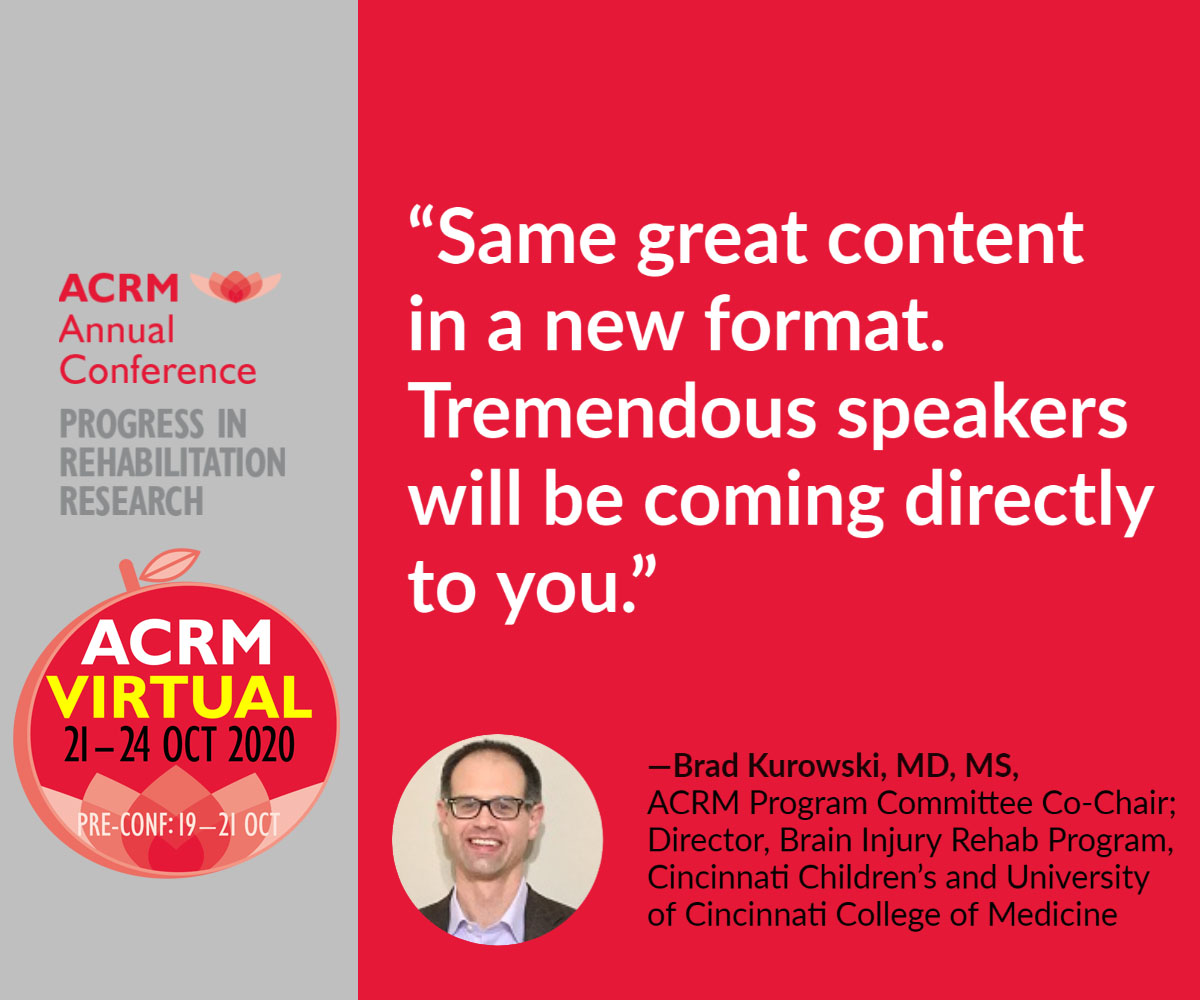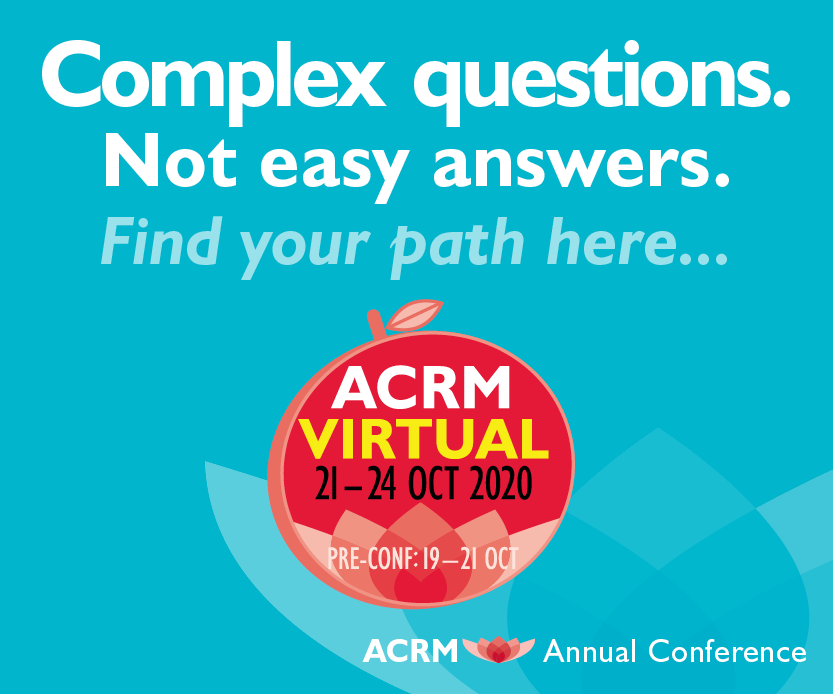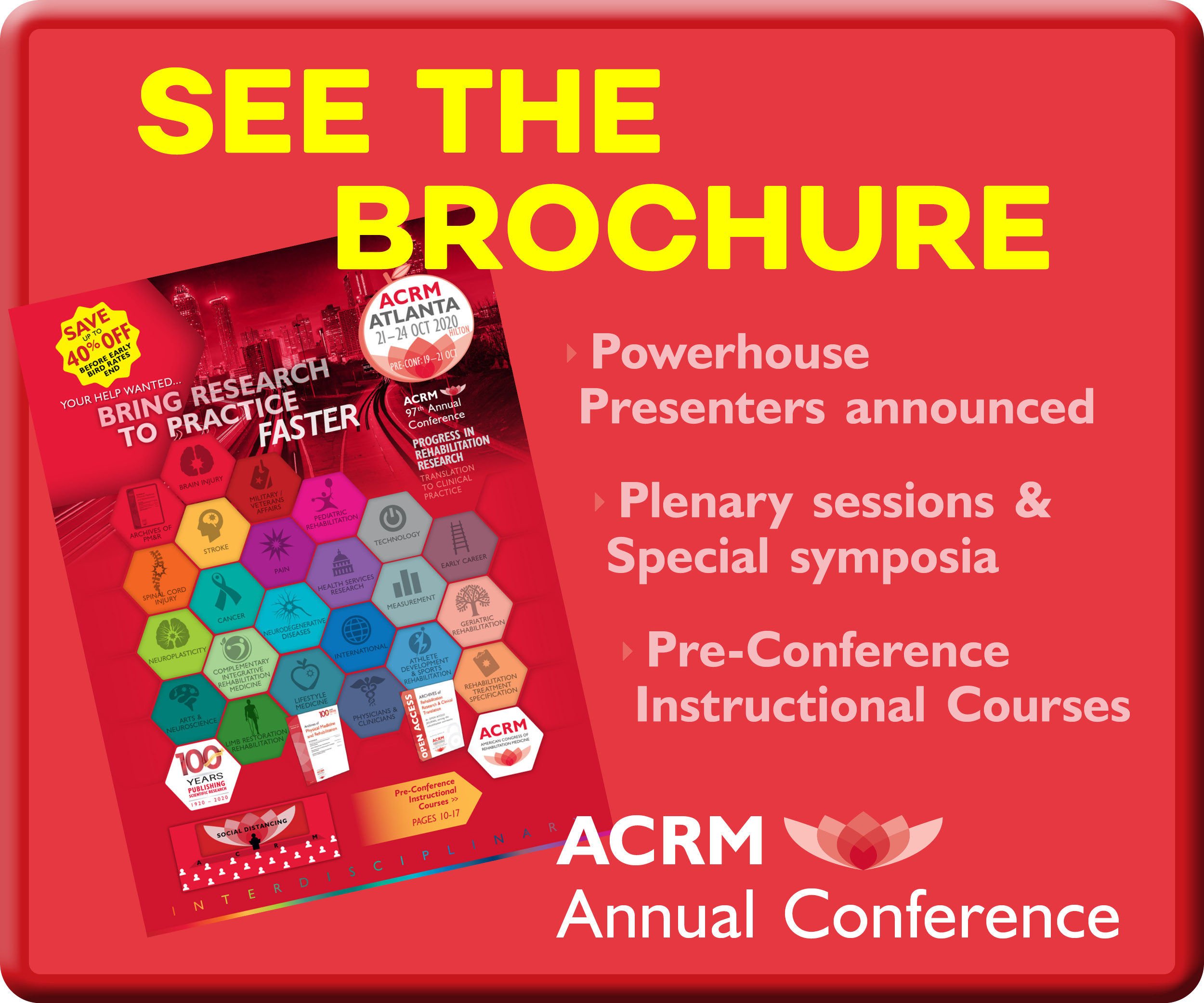2020 Call for Proposals
Call for Late-Breaking Research
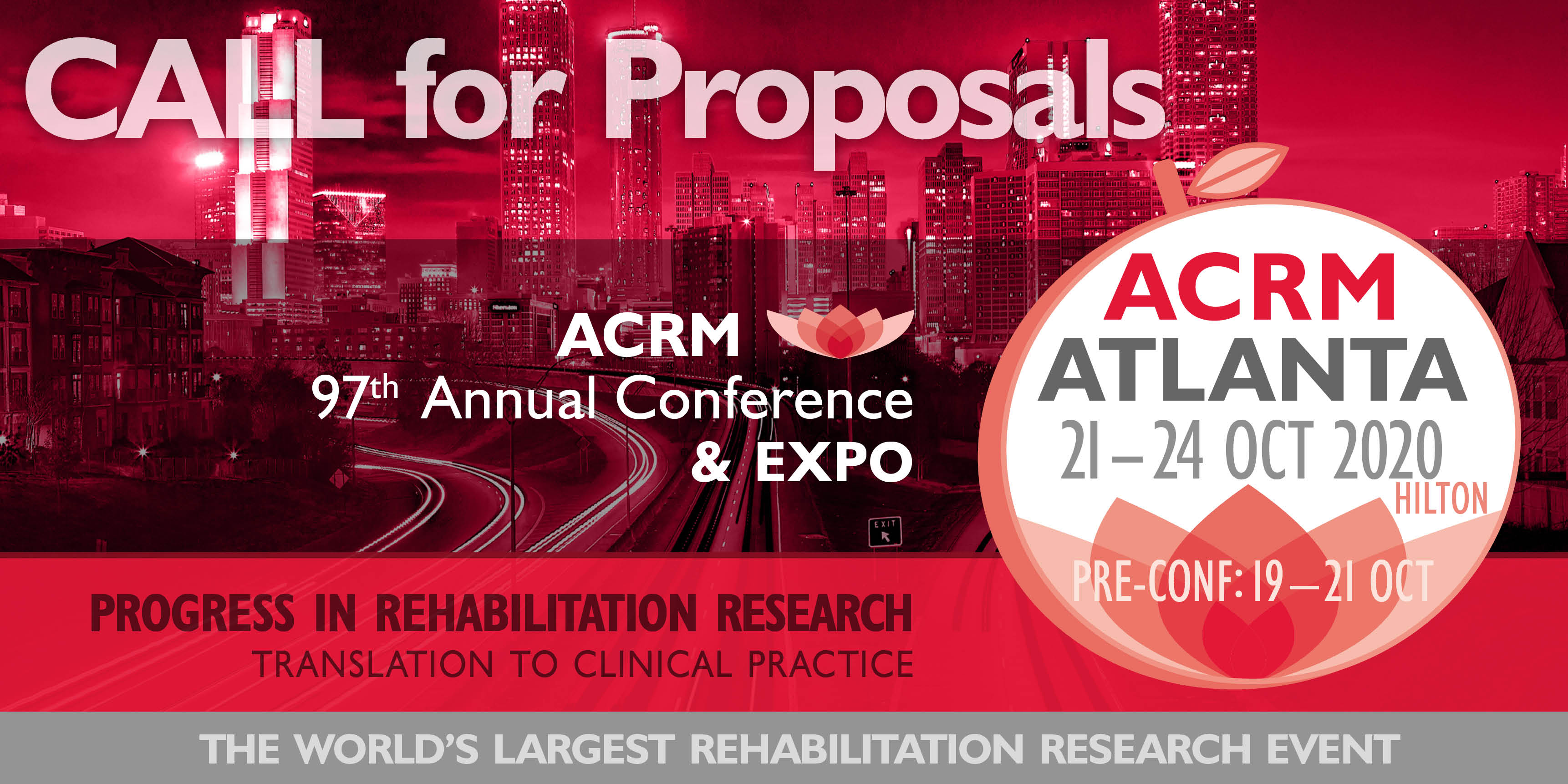
DEADLINES
DUE TO THE CURRENT EXTRAORDINARY DEMANDS ON HEALTHCARE PROFESSIONALS, ACRM has extended the final deadline for paper and poster proposal submissions.
Call for Late-Breaking Research – 16 SEP 2020 FINAL DEADLINE: 28 SEP
Scientific Paper & Poster proposals – Final DEADLINE 15 MAY
LaunchPad Competition Applications due – Final DEADLINE15 MAY
Instructional Course Proposals – FINAL DEADLINE: 4 FEB
Symposia Proposals – FINAL DEADLINE: 25 FEB
NEW! ACRM posters are going electronic. We are calling this ACRM e-Posters.
In addition to in-person… Your work will have more reach than ever when you present at ACRM. Some examples of rich features being accessible within the New & Improved ACRM Online Program & the ACRM App…
ACRM e-Posters BENEFITS for ATTENDEES
All this is done in the ACRM Searchable Online Program & the ACRM App
- You can access the latest greatest rehabilitation scientific posters from ANYWHERE in the world with an internet connection (even the International Space Station)
- Search through and discover hundreds of posters by author, keywords, focus area/track, title
- Scroll through e-posters using handy arrow features
- Easily zoom in/out on posters
- Bookmark faves (bookmarked posters that go into a “My Gallery”)
- Take notes on posters
- Hear audio — the presenter’s narration (when they decide to do so)
- See handouts — when presenters may include along with their poster
ACRM e-Posters BENEFITS for PRESENTERS
All this is done in the ACRM Searchable Online Program & the ACRM App
- Attendees can dive into your poster from ANYWHERE in the world with an internet connection (even the International Space Station)
- Attendees can find YOUR poster more easily — searchable by keywords, focus area / track
- Attendees can dive into your poster details with zoom in/out feature
- Your poster can be Bookmarked as a FAVORITE — that loads into a “My Gallery” section
- Attendees can Take Notes on your poster
- Bring your digital poster to LIFE with your voice
- Poster presenters are strongly encouraged to easily record up to a 30 minute narration to accompany your poster
- Receive a unique QR code for your poster. Include this QR code on your in-person poster so attendees can zip directly to your e-poster
- Include handouts with your e-poster — so attendees can deep-dive into your support documents
- Attendees can easily message you and connect — find future collaborators, get noticed
BE A PART OF IT
Plan now to be a part of the largest interdisciplinary conference in the world for rehabilitation research. Amplify your research at ACRM…
Virtual ACRM Annual Conference
Progress in Rehabilitation Research (#ACRM2020)
CORE CONFERENCE: 21 – 24 OCT 2020
(Plenaries, hundreds of educational sessions, papers, posters, ACRM Community Meetings, receptions, Lecture Luncheons, ACRM EXPO & Learning Center)
PRE-CONFERENCE: 19 – 21 OCT 2020
(Dozens of Instructional Courses, Cognitive Rehabilitation Training, Early Career Development Course)
Proposal Submission Info
- Scientific Papers & Posters
A scientific paper is a moderated oral presentation of 18 minutes including questions and discussion. Posters are graphic presentations of a scientific paper. - Instructional Course Proposals –
FINAL DEADLINE: 4 FEB
Instructional courses may be proposed for a four-hour or eight-hour time block, allowing presenters the opportunity to discuss and present a topic in depth. Courses should be either instructional in nature, offering in-depth training or knowledge translation on a particular topic; or informative, providing detailed coverage of an area of research, methodology, or clinical practice. - Symposia Proposals –
FINAL DEADLINE: 25 FEB
Symposia are 75 minutes in length, presented by professionals with expertise in the topic. - LaunchPad Competition Applications due:
EXTENDED Final DEADLINE: 30 APR
LaunchPad is an annual competition created to highlight innovative rehabilitation technologies developed by non-profit research and engineering labs and startup companies. The competition is held at ACRM’s annual conference each fall. Pitch your company or idea to a panel of rehab industry experts and an audience of clinicians, researchers, engineers, and decision-makers to receive market feedback and win prizes. Learn More >>
See infographic HERE >>
- BUILD YOUR CV
Participating in the ACRM Annual Conference and being published in the ARCHIVES are celebration-worthy career milestones
-
PRESENT your evidence-based knowledge to a large, INTERNATIONAL audience — 3,000+ attendees from 65+ countries expected
-
CONNECT with interdisciplinary colleagues who share your research interests and passions
-
NETWORK with POTENTIAL EMPLOYERS, mentors, collaborators, and funders
-
Gain RECOGNITION as an expert in your topic of research and as an ACRM contributor
-
Get Published in the ARCHIVES
ACRM’s scientific journal, Archives of Physical Medicine and Rehabilitation(ARCHIVES) is the most cited journal in rehabilitation. All abstracts of accepted oral and poster presentations of scientific papers will be published (fully searchable and citable) in the online pages of ARCHIVES. -
AWARDS — Become eligible for prestigious ACRM AWARDS for outstanding posters
-
DISCOVER an interprofessional platform where clinicians can inform research and cutting-edge, evidence-based information can inform best practices in clinical rehabilitation.
-
The ACRM Conference attracts a passionate, interdisciplinary mix of rehabilitation pros from around the world.
Who Should Submit
Rehabilitation professionals or teams who:
- Wish to present their latest research
- Value the opportunity to engage with an interdisciplinary audience
- Offer translational research to inform evidence-based practice
- Include early career and/or international speakers
- Wish to present topics with an interdisciplinary focus
How to Submit
All proposals/abstracts and LaunchPad applications must be submitted online via the ACRM Conference System according to the submission deadlines. To see an outline of the information you will need to enter during the submission process, please download the Proposal Worksheets.
LaunchPad Executive Summary Template
Conference Dates and Location
Pre-Conference Program: 19 October – 21 October 2020
(Instructional Courses, Cognitive Rehabilitation Training, Early Career Development Course)
Core Conference: 21 October – 24 October 2020
(Symposia, Award Lectureships, Lecture Luncheons, Scientific Papers & Posters)
Location: Virtual, from anywhere in the world
Questions?
Contact meetings@ACRM.org or call +1.703.435.5335
Proposal Submission Guidelines
The ACRM Annual Conference: Progress in Rehabilitation Research is the premier educational conference for evidence-based learning in rehabilitation medicine. The 2020 Program Committee invites proposals focused on research evidence and its translation into clinical practice. ACRM is especially interested in the following content topics:
- Arts and Neuroscience
- Athlete Development & Sports Rehabilitation
- Brain Injury
- Cancer Rehabilitation
- Clinical Practice (assessment, diagnosis, treatment, knowledge translation/EBP, implementation science, program development)
- Complementary Integrative Rehabilitation Medicine
- Cross-Cutting
- Geriatric Rehabilitation
- Health Services Research
- International
- Lifestyle Medicine
- Limb Restoration Rehabilitation (including prosthetics/orthotics)
- Measurement
- Military/Veterans Affairs
- Neurodegenerative Diseases
- Neuroplasticity
- Pain
- Pediatric Rehabilitation
- Spinal Cord Injury
- Stroke
- Technology (e.g., robotics, assistive technology, mHealth)
Sample topic areas of interest to conference participants include:
- Evidence-based approaches to diagnosis, treatment, and overall care of individuals with acquired brain injury, spinal cord injury, stroke, neurodegenerative diseases, pain, and cancer
- Applications of technology in rehabilitation research and practice (prosthetics, orthotics, assistive technology, implantable devices, robotic devices)
- Evidence-based approaches for remediation of cognitive impairment, depression, post-traumatic stress disorder, sleep disturbances, and pain
- Role of exercise and “activity-based” therapy in neuro-recovery
- Use of innovative information and communications technology in rehabilitation (tele-health, tele-rehabilitation, Internet and social media)
- Use of neuro-imaging in diagnosis and treatment
- Methods for translation of evidence into clinical practice
- Alternatives to randomized clinical trials (RCTs) for validating treatment effectiveness and application of RCT findings into clinical practice
- Application of biomechanics, motor control, and learning perspectives in rehabilitation.
Proposals that are interdisciplinary in nature, or include international or early career presenters are encouraged!
Avoidance of Commercialism
All presentations must avoid commercialism. Presentations that constitute promotion and advertising will be prohibited. This includes pervasive and inappropriate use of logos. No advertising matter of any kind may be distributed. No material may be displayed that in any way directly promotes the commercial interest of any company or enterprise, or of the author(s)/presenter(s). If the cost of presentation has been underwritten to any extent, a clear acknowledgment stating support and identifying the particular source should be included (e.g., “The support of [name of corporation/institute] for this project is gratefully acknowledged.”) Statements made in presentations are the sole responsibility of the author(s)/presenter(s). Any statement made should not be viewed as, or considered representative of, any formal stance or position taken on any product, subject, or issue by ACRM.
Accreditation Requirements
At the time of online submission, submitters must provide complete contact information (e.g., name, credentials, title, institution, mailing address, email, and phone) for all authors/presenters associated with the submission. Further, all submitters, authors, and presenters must submit a current CV or resume and electronically sign a continuing education (CE) agreement and disclosure form. Failure to do so prevents acceptance of a submission. An electronic copy of presentations must be held on file with ACRM.
Conference Attendance and Presenter Expenses
Presenters for all accepted proposals are required to register for the conference, and are fully responsible for all of their expenses related to the conference (e.g., registration, airfare, hotel, meals).
QUESTIONS?
Contact Maegan Criscione, +1.703.435.5335
Presentation Types
1) Pre-Conference Instructional Courses
Instructional Course Proposals Deadline: FINAL DEADLINE: 4 FEB
Instructional courses may be proposed for a four-hour or eight-hour time block, allowing presenters the opportunity to discuss and present a topic in depth. Courses should be either instructional in nature, offering in-depth training or knowledge translation on a particular topic; or informative, providing detailed coverage of an area of research, methodology, or clinical practice. Courses will be scheduled as pre-conference sessions on 19, 20, or 21 October 2020 depending upon the length and level of interest in the topic. Instructional courses typically average about 18 attendees each, providing the opportunity for small-group interaction and hands-on activities.
The proposal should include a course title, course director/lead presenter, all presenters with credentials and affiliations, detailed course outline, and duration. The submission must describe the instructional method to be used, and the content and format of presentations. It should also identify the intended audience (i.e., researchers, clinicians, administrators). A concise and descriptive summary of the course is also required for marketing purposes.
There must be multiple presenters identified. All presenters must furnish necessary disclosure information concerning potential conflicts of interest and must agree to have the course audio or video-recorded for future re-broadcast. Presenters will not be paid a stipend or honorarium. All presentations must be submitted for review prior to the conference.
Selection Criteria
Each complete submission received by the published due date will be independently peer-reviewed. Each proposal is peer-reviewed for the following elements: (1) scientific, clinical, or didactic quality; (2) interdisciplinary nature; (3) broad appeal to the ACRM membership; (4) timeliness of the topic; (5) and contribution to the state-of-the-art of rehabilitation science. The conference Program Committee reserves the right to offer alternative or reduced time slots for presentations based on submissions. Acceptance/decline notifications are due to Instructional Course submitters by 18 February 2020.
2) Symposia
Symposia Proposals Deadline: FINAL DEADLINE: 25 FEB
Symposia are 75 minutes in length, presented by professionals with expertise in the topic. There is a mandatory period of 10 minutes for questions and discussion, and more time may be allotted. Symposia will be scheduled on 21, 22, 23, or 24 October 2020. Desired symposia submissions:
- Show how current research can effectively guide clinical practice.
- Identify clinical questions where additional research data are needed.
- State a direct relationship between the subject matter and evidence-based practice.
The following components are encouraged: interdisciplinary content, presenters from multiple institutions, international presenters, and a point/counterpoint format, as appropriate, for the discussion period.
There must be more than one presenter identified. All presenters must furnish necessary disclosure information concerning potential conflicts of interest and must agree to have the course audio or video-recorded for future re-broadcast. Presenters will not be paid a stipend or honorarium. All presentations must be submitted for review prior to the conference.
Selection Criteria
Each complete submission received by the published due date will be independently peer-reviewed. Each proposal is peer-reviewed for the following elements:
1. Scientific, clinical, or didactic quality
2. Interdisciplinary nature
3. Broad appeal to the ACRM membership
4. Timeliness of the topic
5. Contribution to the state-of-the-art of rehabilitation science.
The conference Program Committee reserves the right to offer an alternative or reduced time slot for presentations based on submissions. Acceptance/decline notifications are due to Symposia submitters by 3 April 2020.
3) Scientific Papers & Posters
Scientific Papers & Posters Deadline: 15 May EXTENDED through 9 JUL
A scientific paper is a moderated oral presentation of 17 minutes including questions and discussion. Outstanding submissions may be chosen for a longer presentation. AV equipment may be used to supplement the presentation.
Posters are graphic presentations of a scientific paper. Submissions must include objectives, hypotheses, methodology, and results in the abstract (see Submission Guidelines below). Submissions with pending results are not accepted.
Submission Guidelines
A 275-word abstract must follow one of the two structured abstract formats required for submission of general articles to the Archives of Physical Medicine and Rehabilitation. See the Instructions for Structured Abstracts.
Structured abstracts for Research Papers/Posters must have these sections:
- Research Objective(s)
- Design
- Setting
- Participants (animals or cadavers or specimens, for orthotics only)
- Interventions
- Main Outcome Measure(s)
- Results
- Conclusions
- Author(s) Disclosures
Systematic/Meta-analytic Reviews must have these sections:
- Research Objective(s)
- Data Sources
- Study Selection
- Data Extraction
- Data Synthesis
- Conclusions
- Author(s) Disclosures
The total length of all sections in the submission must not exceed 275 words. Tables or other graphics are not permitted. Submission must include three to five continuing education learning objectives. This is required whether the abstract is eventually selected for CE/CME or not.
Submission must indicate all participants in the abstract, listing the lead investigator first, followed by all other participants in the order in which they should appear in print. The submitter has the ability to complete all information for each participant, though we recommend that participants log in to the system to complete the information themselves.
Selection Criteria
Each complete submission received by the published due date will be independently peer-reviewed. There should be no more than ONE presenter identified for Scientific Papers and Posters. Each abstract will be reviewed for the following elements:
1. Scientific and clinical quality
2. Broad appeal to the interests of the ACRM membership
3. Interdisciplinary nature
4. Timeliness of the topic
5. Contribution to the state-of-the-art of rehabilitation science.
Acceptance/decline notifications are due to paper and poster proposal submitters by 22 May 2020.
Abstract Publication & Poster Awards
All abstracts of accepted papers and posters will be published in the online pages of the ACRM journal, Archives of Physical Medicine and Rehabilitation, November issue, where they will be fully searchable and citable. Archives is the most-cited journal in rehabilitation.
Accepted posters will have the opportunity to be considered for the ACRM Poster Awards. Further, a subset of the poster award winners will have the opportunity to present their poster in a Poster Grand Round session.
*Posters accepted during the Call for Late-Breaking Research will be published in the December issue of the journal and will not be eligible for poster awards.
4) Intensive Cross-Cutting Program
Symposia, Lightning Round of short presentations, and Poster proposals
Intensive Cross-Cutting Programs will integrate symposia, Lightning Rounds of short presentations, and Posters with the objective of aligning a variety of disciplines on a single topic. One Intensive Cross-Cutting Program will be offered on each day of the conference, opposed by regular programming. However, none of the opposing programming will pertain to the Intensive Cross-Cutting Program topic for that day.
SAMPLE SCHEDULE
*Times may vary based on block
- 75-minute research symposium
- 90-minute Lightning Round of 15-minute research presentations, i.e., short symposia or scientific papers
- Lunch with scientific poster presentations
- 75-minute clinical implementation symposium
- 90-minute Lightning Round of 15-minute clinical implementation presentations, i.e., short symposia or scientific papers
1. mHealth Applications in Neurorehabilitation: Interaction of Neuroplasticity, Technology and Clinical Practice
2. Lifestyle Approaches to Achieve Long Term Health in Rehabilitation Populations
3. Post-Acute and Community Rehabilitation: Present and Future Practice & Needs
SELECTION
If you wish to participate in one of the three Intensive Cross-Cutting Programs, be sure to select this presentation format when submitting your proposal. If your proposal is not selected by the Program Committee for an Intensive Cross-Cutting Program, it will be reconsidered for presentation on a different day within the regular program.
Proposal Submission Selection Criteria
Each complete submission received by the published due date will be independently peer reviewed.
Each proposal for a symposium will be reviewed for the following elements: (1) contribution to state of the art of rehabilitation science, including scientific rigor and the presentation of new findings (2) Clinical and/or translational relevance (3) Pertinent to the interests of the ACRM membership; (4) Expertise and qualifications of the presenters; (5) timeliness of the topic; (6) overall impact and quality.
Weighting for Each Criteria
| Contribution to state of the art of rehabilitation science, including scientific rigor and the presentation of new findings | 15% |
| Clinical and/or translational relevance | 12.5% |
| Pertinent to the interests of the ACRM membership | 7.5% |
| Expertise and qualifications of the presenters | 7.5% |
| Timeliness of the topic | 7.5% |
| Overall impact and quality | 50% |
Guiding Questions for Scoring Each Attribute
CONTRIBUTION TO STATE OF THE ART OF REHABILITATION SCIENCE, INCLUDING SCIENTIFIC RIGOR AND THE PRESENTATION OF NEW FINDINGS
1. To what degree are the concepts, approaches or methodologies, or interventions reflective of rigorous scientific principles, evidence-based research, or other generally accepted principles or practices?
2. Does the submission indicate that new findings will be presented (including findings from individual studies as well as evidence-based reviews)?
3. Does the topic demonstrate consistency with available literature and evidence?
4. Is a clear, reflective component identified?
5. Does the abstract articulate purpose and content of the presentation?
CLINICAL AND/OR TRANSLATIONAL RELEVANCE
1. To what degree does the session have relevance to rehabilitation practice?
2. Will methods and implications for translating research findings and evidence into practice be discussed?
PERTINENCE TO THE INTERESTS OF THE ACRM MEMBERSHIP
1. To what degree are the concepts in the abstract relevant to one or more of the content topic areas of most interest to ACRM:
- Arts & Neuroscience
- Athlete Development & Sports Rehabilitation
- Brain Injury
- Cancer Rehabilitation
- Clinical practice (assessment, diagnosis, treatment, knowledge translation/EBP, implementation science, program development)
- Complementary Integrative Medicine
- Cultural Competency
- Ethics
- Geriatric Rehabilitation
- Health Services Research
- International
- Lifestyle Medicine
- Limb Restoration
- Measurement
- Military and Veterans Affairs
- Neurodegenerative disease (e.g., MS, Parkinson’s disease)
- Neuroplasticity (includes neuroscience)
- Pain
- Pediatric Rehabilitation
- Spinal Cord Injury
- Stroke
- Technology (e.g. robotics, assistive technology, mHealth)
2. Interdisciplinary: To what degree are the concepts presented in the abstract relevant to a large number of health professionals and researchers that comprise the ACRM membership?ACRM audiences include: rehabilitation medicine researchers, physicians, nurses, psychologists, counselors, occupational therapists, physical therapists, speech-language professionals, disability management specialists, healthcare executives, dieticians and others.
EXPERTISE AND QUALIFICATIONS OF THE PRESENTERS
1. Is there relevant expertise to present the topic?
2. Is the presentation topic consistent with the focus of the presenters’ training and work?
3. Is the level of material appropriate for the identified target audience (introductory, intermediate, advanced)?
TIMELINESS OF THE TOPIC
1. To what degree are concepts/findings presented in the abstract reflective of recently released, significant information?
2. To what degree are the concepts in the abstract a hot topic of interest to a large population of the ACRM audience?
Scoring Guidance
| Impact | Score | Descriptor | Additional Guidance on Strengths/Weaknesses |
| High | 9 | Exceptional | Exceptionally strong with essentially no weaknesses |
| 8 | Outstanding | Extremely strong with negligible weaknesses | |
| 7 | Excellent | Very strong with only some minor weaknesses | |
| Medium | 6 | Very Good | Strong but with numerous minor weaknesses |
| 5 | Good | Strong but with at least one moderate weakness | |
| 4 | Satisfactory | Some strengths but also some moderate weaknesses | |
| Low | 3 | Fair | Some strengths but with at least one major weakness |
| 2 | Marginal | A few strengths and a few major weaknesses | |
| 1 | Poor | Very few strengths and numerous major weaknesses |
QUESTIONS?
Contact Maegan Criscione, +1.703.435.5335
ABOUT ACRM
ACRM | American Congress of Rehabilitation Medicine is an organization of rehabilitation professionals from around the world dedicated to serving people with disabling conditions by supporting research that promotes health, independence, productivity, and quality of life; and meets the needs of rehabilitation clinicians and people with disabilities.
With the mission of IMPROVING LIVES through interdisciplinary rehabilitation research, ACRM curates and disseminates world-class rehabilitation research — translated for clinical practice — IN PERSON, IN PRINT and ONLINE.

